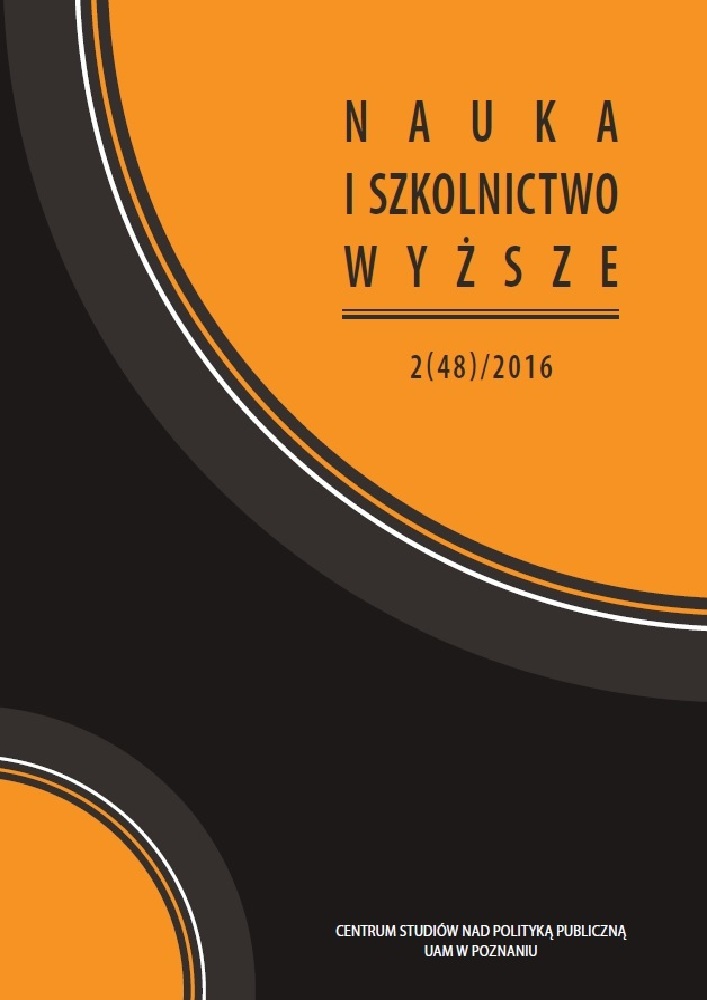Abstrakt
W artykule analizujemy cztery części składowe pracy akademickiej: pracę badawczą, dydaktykę, pracę administracyjną oraz współpracę naukową z innymi badaczami, wykorzystując materiały z raportu „Nie zostaje mi czasu na pracę naukową”. Pokazujemy, jak pracownikom naukowo- dydaktycznym ze stopniem doktora układa się kalendarz ich pracy i jak zwiększają oni swoje budżety czasu pracy, żeby zdobyć czas na pracę naukową i habilitować się na czas. Przybliżamy też skutki pracy w takich reżimach czasowych. Efektem naszych badań jest ukazanie pewnego modelu pracy akademickiej, w którym porównane są ze sobą typy zadań składających się na całokształt pracy osób z tytułem doktora zatrudnionych na etatach naukowo-dydaktycznych.
Bibliografia
Acker, S., Armenti, C. (2004). Sleepless in academia. Gender and Education. 16(1): 3-24.
Berg, M., Seeber, B.K. (2013). The Slow Professor: Challenging the Culture of Speed in the Academy. Transformative Dialogues: Teaching & Learning Journal. 6 (3): 1-7.
Colley, H., Henriksson, L., Niemeyer, B., Seddon, T. (2012). Competing time orders in human service work: Towards a politics of time. Time & Society. 21 (3): 371-394.
Crary, J. (2015). 24/7. Późny kapitalizm i koniec snu. Tłum. D. Żukowski. Kraków: Krater.
Cummings, W.K., Shin, J.C. (2014). Teaching and Research in Contemporary Higher Education: An Overview. W: J.C. Shin, A. Arimoto, W.K. Cummings, U. Teichler (red.). Teaching and Research in Contemporary Higher Education. Systems, Activities and Rewards (1-12). Dordrecht – Heidelberg – New York – London: Springer.
Hattie, J., Marsh, H.W. (1996). The Relationship Between Research and Teaching: A Meta- Analysis. Review of Educational Research. 66 (4): 507-542.
Hey, V. (2001). The Construction of Academic Time: Sub/contracting Academic Labour in Research. Journal of Education Policy. 16 (1): 67-84.
Kowzan, P., Krzymiński, D. (2012). Pomiędzy alienacją a emancypacją: rola rad doktoranckich w ustalaniu pozycji doktorantów na przykładzie Uniwersytetu Gdańskiego. W: M. Trawińska, M. Maciejewska (red.). Uniwersytet i emancypacja: wiedza jako działanie polityczne - działanie polityczne jako wiedza (57-73). Wrocław: Interdyscyplinarna Grupa Gender Studies.
Kowzan, P., Zielińska, M., Kleina-Gwizdała, A., Prusinowska, M. (2016)
„Nie zostaje mi czasu na pracę naukową”. Warunki pracy osób ze stopniem doktora, zatrudnionych na polskich uczelniach. Raport NOU. Gdańsk – Bydgoszcz – Warszawa: Nowe Otwarcie Uniwersytetu.
Kwiek, M. (2015). Uniwersytet w dobie przemian. Warszawa: Wyd. Naukowe PWN.
Kwiek, M. (2016). The European research elite: A cross-national study of highly productive academics in 11 countries. Higher Education. 71 (3): 379-397.
Kwiek, M., Antonowicz, D. (2015). The Changing Paths in Academic Careers in European Universities: Minor Steps and Major Milestones. W: T. Fumasoli, G. Goastellec, B.M. Kehm (red.). Academic Work and Careers in Europe: Trends, Challenges, Perspectives (41-68). Cham -Heidelberg - New York - Dordrecht - London: Springer International Publishing.
Marsh, H.W., Hattie, J. (2002). The Relation Between Research Productivity and Teaching Effectiveness: Complementary, Antagonistic, or Independent Constructs? The Journal of Higher Education. 73 (5): 603-641.
Menzies, H., Newson, J. (2007). No Time to Think: Academics’ life in the globally wired university. Time & Society. 16 (1): 83-98.
Menzies, H., Newson, J. (2008). Time, stress and intellectual engagement in academic work: Exploring gender difference. Gender, Work and Organization. 15(5): 504-522.
Musiał, K. (2014). Reformy edukacji wyższej w Finlandii – w obszarze finansowania szkół wyższych. Warszawa: Instytut Badań Edukacyjnych.
Müller, R. (2014). Racing for What? Anticipation and Acceleration in the Work and Career Practices of Academic Life Science Postdocs. Forum Qualitative Sozialforschung/Forum: Qualitative Social Research. 15 (3), art. 15. http://www.qualitative-research.net/index.php/fqs/article/view/2245/3726 [20.10.2016].
O’Neill, M. (2014). The slow university: Work, time and well-being. Forum: Qualitative Social Research, 15(3), art. 14. http://discoversociety.org/2014/06/03/the-slow-university-work-time-and-well-being/ [20.10.2016].
Rosa, H. (2003). Social Acceleration: Ethical and Political Consequences of a Desynchronized High-Speed Society. Constellations. 10 (1): 3-33.
Rutkowiak, J. (2010). O tęsknocie do uniwersyteckiej przyjaźni: przemiany w uniwersytecie, przemiany w jego ludziach. Teraźniejszość – Człowiek – Edukacja: Kwartalnik Myśli Społeczno-Pedagogicznej. 51 (3): 53-65.
Shin, J.C., Arimoto, A., Cummings, W.K., Teichler, U. (red.) (2014). Teaching and Research in Contemporary Higher Education. Systems, Activities and Rewards. Dordrecht – Heidelberg – New York – London: Springer.
Standing, G. (2014). Prekariat. Nowa niebezpieczna klasa. Tłum. K. Czarnecki, P. Kaczmarski, M. Karolak. Warszawa: Wyd. Naukowe PWN.
Szadkowski, K. (2016). Socially Necessary Impact/Time: Notes on The Acceleration of Academic Labor, Metrics and The Transnational Association of Capitals. Teorie Vědy /Theory of Science. XXXVIII: 1-30.
Tomlinson, J. (2007). The Culture of Speed. The Coming of Immediacy. Los Angeles – London – New Delhi – Singapore: Sage Publications.
Vostal, F. (2014). Speed kills, speed thrills: Constraining and enabling accelerations in academic work-life. Globalisation, Societies and Education. 13 (3): 295-314.
Vostal, F. (2015). Academic life in the fast lane: The experience of time and speed in British academia. Time & Society. 24 (1): 71-95.
Vostal, F. (2016). Accelerating academia: the changing structure of academic time. London: Palgrave MacMillan.
Ylijoki, O.-H. (2011). Boundary-work between work and life in the high-speed university. Studies in Higher Education. 38: 1-14.
Ylijoki, O.-H., Mäntylä, H. (2003). Conflicting Time Perspectives in Academic Work. Time & Society. 12 (1): 55-78.
Zielińska, G., Kowzan, P. (2016). Mobilność zagraniczna polskich doktorów – możliwości i bariery. Nauka i Szkolnictwo Wyższe. 1 (47): 183-203.
